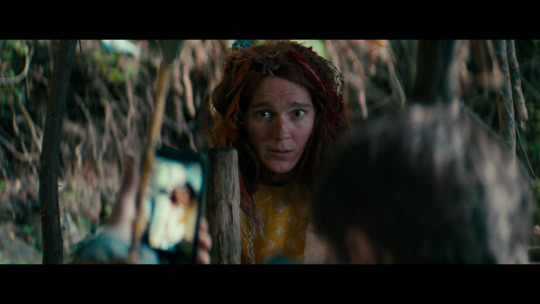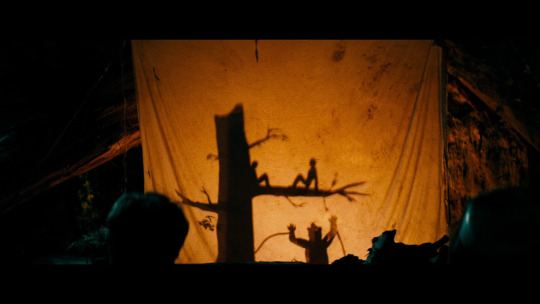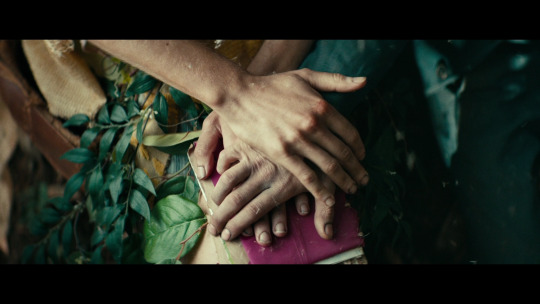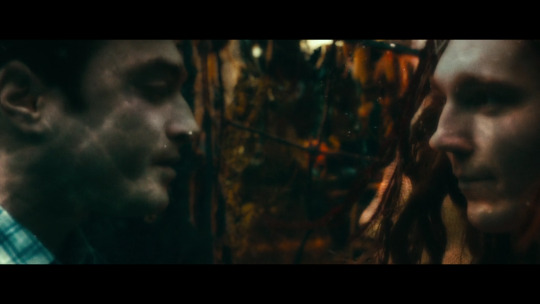#and that has too many real-world implications and influences to talk about in a goddamn supernatural post so. take this.
Text
secret good spn that lives in my head episode that is told entirely in flashback and analyzes the winchester family dynamic and is called “cat’s cradle”
#listen.#unfortunately every time i get back into vonnegut i think of dean winchester#and like????#oldest kid who takes care of both the younger kids and the father as if they're all her children??? dean 100%#oldest kid is fiercely protective of younger sibling while also disrespecting his agency intelligence and autonomy??#youngest kid has complicated relationship with dad due to him being away at work all the time?#not to mention the dad in the book only tries to connect with his son the day the weapon of mass destruction that he built goes off#which definitely could be a parallel to john only trying to connect with sam through hunting which fails because sam HATES hunting#ALSO oldest sibling absolutely hero-worships the hell out of the father while ignoring his problematic and violent aspects#I could get more into the parallels between sam and newt but then i would have to get into some gross ableism stuff that happens in the book#and that has too many real-world implications and influences to talk about in a goddamn supernatural post so. take this.#spn#supernatural#dean winchester#sam winchester#john winchester#dean and john#sam and john#vonnegut#cat's cradle
24 notes
·
View notes
Video
youtube
Great Albums is back for a third time! This week, we discuss Dazzle Ships, the avant-garde masterpiece that was so infamously weird, it almost “sank” the pop career of Orchestral Manoeuvres in the Dark. Or did it? As usual, you can find a full transcript of the video under the break, if you’d like to read it instead.
Welcome to Passionate Reply, and welcome to Great Albums. Today, I’ll be talking about an album that many would consider OMD’s best, and many would consider the last great album they ever made: 1983’s Dazzle Ships, their fourth studio LP. It has a reputation that precedes it, as a strange, experimental, and avant-garde album. And I can’t argue with that too much, when it has tracks that sound like "ABC Auto-Industry."
The most obvious thing one can say about Dazzle Ships is that it’s dense and rich with samples. You’ll hear found sounds ranging from a “Speak and Spell” toy to a radio broadcast from Czechoslovakia. It’s a magpie’s nest constructed of garbage and baubles, collage-like and conscientiously artificial. And OMD’s Paul Humphreys and Andy McCluskey managed to make it before sampling became easier and hence more widespread later in the 1980s, thanks to advancements in digital technology. In its own day, it was, famously, a huge flop, baffling even the critics, which makes it tempting to argue that the world simply wasn’t ready for it. Popular legend says that Humphreys and McCluskey were essentially forced to make increasingly soft, pop-oriented music for years afterward, usually at the hands of their label’s higher-ups.
Is that story really true? Well, I don’t know, and I’m not sure if anybody really does. But I think it’s important that we entertain some doubt. Regardless of its actual veracity, this legend is offering us a simplistic narrative of art and capital butting heads, and one that we see repeated all too often in music journalism. It’s a story that expects us to believe that experimental music is good by default, and the natural goal of music and all the people who make it--and, conversely, that accessible music is bad, and anyone who writes a song you can dance to is always after profit, never craft.
Ultimately, though, the most important reason why I’m asking you to leave this question at the gate is that it’s simply a less interesting way to think about art. What I think is truly ingenious about OMD is their ability to combine a pop sensibility with that bleeding-edge experimentation, and vice versa. I don’t think of Dazzle Ships as just an inscrutable, esoteric musical ready-made, but rather something capable of animating and enriching a bunch of otherwise mundane sounds. A word I might use for it is "challenging," because it isn't simply off-putting--it has a certain charm that invites you to stick around and work through it, and you don't feel like it's a waste of your time. I think the underlying pop DNA offered by Dazzle Ships is a big part of that.
In “Genetic Engineering,” the samples from that Speak & Spell are contrasted with a more traditional chorus, which rises above the chaos, stirring and anthemic. It’s a song full of friction, not only between these musical ideas, but in ideas about technology and our future. Like many great works of electronic music, especially earlier in its history, Dazzle Ships is deeply concerned with science and technology, and the ways they’ve structured our world. These guys wrote “Enola Gay” a few years earlier, sure, but there’s much more than Luddite, dystopian thinking here! Dazzle Ships walks a tightrope between romantic adoration of the promise of a better tomorrow, and the tempered uncertainty we’re forced to develop, when we witness the devastation our most horrifying inventions have wrought already. Something that helps sell the former is the motif of childhood: in addition to the Speak & Spell, “Genetic Engineering” also features a children’s toy piano, and prominently references “children” in its lyrics. And “Telegraph,” the album’s other single, sees fit to reference “Daddy.”
Touches like these, and the centering of not-so-new technologies like telegraphy and radio, carry us backward in time. Dazzle Ships has a sense of nostalgia for the technological explosion of the Midcentury, when household technologies were improving in ways that saved time and labour, and faith in “better living through science” was high. It’s not a wistful or introspective nostalgia, but rather one that taps into the bustling excitement of living through that era. That retro styling helps us situate ourselves in a childlike mindset: optimistic, but somewhat naive. Children are highly imaginative, and become enthralled with possibility, but don’t always understand every implication their actions have.
But, as I said, “Telegraph” and “Genetic Engineering” were the album’s singles; the typical track on *Dazzle Ships* sounds more like “ABC Auto-Industry.” The track listing is structured such that these more conventional songs are surrounded by briefer, and more abrasive, intrusions. They become signals in the noise, as though we’re listening to them on the radio--or ships, rising above some stormy seas. Several tracks, such as “International,” also feature a more dissonant intro, on top of that, crowding their main melodies inward.
Over the years, many critics have been quick to contrast Dazzle Ships with OMD’s other albums, but I actually think it has a lot in common with their preceding LP, 1981’s Architecture & Morality, and seems to me to flow naturally from the direction the band had already been going in. Architecture & Morality is a lively mix, with moody instrumentals like “Sealand,” guitar-driven numbers like “The New Stone Age,” and catchy, intuitive pop songs like “Souvenir.” Architecture and Morality proved to be their most successful album, when its title track sounds like this. I fail to see how it’s tremendously different than the title track of Dazzle Ships, which leads us on a harrowing sea chase, with radar pings quickly closing in.
That nautical theme is a great segue to discuss the album’s visual motif. Like all of OMD's first five albums, its sleeve was designed by Peter Saville, most famous for his stunning work for New Order. The cover and title were inspired by a painting Saville had seen, Edward Wadsworth’s *Dazzle Ships in Drydock at Liverpool,* which portrays WWI warships painted in striking, zebra-like geometric patterns. These sharply contrasting “razzle dazzle” designs weren’t “camouflage,” but rather served to confuse enemy forces’ attempts to track them, and predict their motions. Dazzle ships were killing machines that fought dirty...and they were also beautiful. It’s a potent, complex symbol, and it’s a natural fit for an album that’s also capricious, perplexing, and captivating in its uniquely modern terror. Saville’s sleeve design features both a die-cut design as well as a gatefold; peeking through the cover’s “portholes” reveals the interior, where we find a map of the world, divided by time zones. It’s yet another reminder of how technology has reshaped the planet, connecting the human race while also creating divisions.
Earlier, I argued that Dazzle Ships isn’t that different from OMD’s preceding LP, and I’d also suggest that their follow-ups to it aren’t all that different, either. It’s easy to see the influence of Dazzle Ships on their most recent work, made after reforming the group in the late 00s, and informed by the critical re-evaluation and cult acclaim of their alleged masterpiece. But even in the 80s, they basically continued the pattern of layering easy to love, “obvious single choice” tracks alongside more experimental, sample-heavy ones. Compare the title track of their sixth LP, 1985's *Crush.*
Even the greatest of pop hitmakers can't maintain a streak in the charts forever--it's not the nature of mainstream pop charts. Not even in the 1980s, when you could get away with quite a lot of electronic weirdness...at least for a while. Looking back and listening to "Maid of Orleans," it's almost hard to believe it was one of OMD's biggest hits. Is it really less weird than something like "Telegraph"? Perhaps they had simply reached the end of their imperial phase...whether they really had that stern talking-to or not.
It's not so much that Dazzle Ships isn't weird, so much as it is foreseeable that a nerdy, left-of-center band like OMD would have come up with it. Dazzle Ships IS excellent--it’s a Great Album! But it's good enough that I think it deserves to be heard and valued on its own terms. The album is too goddamn good--too compelling, too spell-binding--to be reduced to "that one album the plebs were too dumb to really get." I'm not clearing the air because I think this album is overrated, but because I think it deserves better, deeper discourse than it gets. A truly great album is great whether it sells or it doesn't, right? My advice is to never let art intimidate you, no matter how obtuse people say it is. Send your ship on that plunge into the dark waters of the unknown--you might find something beautiful.
That said...my favourite track overall is “Radio Waves,” an irresistibly fun cut that could easily have become a third single. Since “Genetic Engineering” and “Telegraph” live on side one of the record, “Radio Waves” is really the only “reprieve” we get on side two, smack in its middle. It really stands out, in context--almost like the opposite of how a more conventional album might have one out-there track that catches you off guard. Aside from all of that, though, the song also stands perfectly well alone. I have a real soft spot for music about music, how it’s made and transmitted, and “Radio Waves” is simply one hell of a ride.
Thanks for reading!
#great albums#music#omd#orchestral manoeuvres in the dark#album review#album reviews#dazzle ships#peter saville
17 notes
·
View notes
Text
Let’s Movie Nerd-Out About Identity and Memory in ‘Swiss Army Man’
For a story conceived of as a running gag about the worst possible premise for a film, Swiss Army Man sure raises a lot of deep questions. (Heh, ‘raises.’) At first glance, this movie looks like an overly-sincere indie dramedy in which New Age open-mindedness dismantles antiquated social mores and Daniel Radcliffe farts as far away from the Harry Potter franchise as possible – a combination that works or flounders depending on whether you’re on board with the joke – but there’s a subtler side. Issues of identity and memory (or more broadly, knowledge) crop up everywhere in this love story, and I expect they will be a topic of speculation for many years to come. With a movie this crazy in particular, I want to acknowledge that we can all play the subtext game and wind up with wildly different interpretations, so this is not me painting anyone with an extra-saucy coat of shade. A lot depends on how you value the information a film throws at you, and generically, magical realism likes to force its audience to choose what to believe. So, bearing that in mind, let’s make like Hank and Manny and dive right in. Major spoilers below.

Now that we’re all down at the exclusive Club Spoilers, I should clarify my usage of the word “identity.” There are people who argue that Swiss is secretly a tale of transgenderism, and while I think the ending is open enough that this is possible (we simply don’t spend enough time with the newly-liberated Hank to know), it isn’t my purpose here to argue for or against that conclusion. Rather, I mean to look at Swiss’s theme of identity in a more holistic sense. Hank, Manny, and Sarah exist in a web of imposed and appropriated ‘selves’ which fluctuates over the course of the film, and it is this interlocking of the three characters that I intend to look at.
Some movies go out of their way to provide a full exposition of their main characters in the first several minutes, particularly when they appear to us someplace they wouldn’t normally be, like the middle of goddamn nowhere. Not so in Swiss Army Man, which is coy with a purpose. The less that is confirmed, the more the audience and other characters rely on imagination to fill in the blanks, and the easier it is to blend in magical elements without them feeling jarring; this produces an atmosphere that is conducive hyperbole. Our knowledge of Hank is vague and emotional, that he is a lonely, unfulfilled person driven to infirmity -- but like Manny, in absence of a concrete context, we accept the world of the film on his terms. At the moment that his life fails to flash before his eyes, a strange man appears on the shore, and we get our first memory: Hank on the bus, looking up (as we learn later) in anticipation of Sarah climbing aboard. He “didn’t see much” then, as he explains to the corpse he has resuscitated into only the barest, basest form of reflexive life – but he did see Manny. Cue the violins.

When Hank wakes up again on the coast, his attention shifts to trying to figure out whether Manny is a hallucination, a scientific oddity, or a miracle. It’s a question that is never totally resolved and which creates a fundamental problem in trying to ‘identify’ Manny, that he may be to a greater or lesser extent Hank’s projection. To start with, Hank treats him like a child, or more specifically, as Hank’s father treated him when he was a child. He then tries to stimulate Manny’s memory, but all it establishes is his fondness for music. For all intents and purposes, Manny is a blank slate, and so it falls to Hank to educate him about home and why they should go there. Making use of conveniently-placed garbage, he sets about illustrating life in his society, ostensibly for Manny’s benefit but also to a great extent for his own, using Manny as another tool through which to dramatize and fix his own personal perceptions and traumas. And because Manny has little to no background on what’s going on, like a child looking to his parent, the things Hank says and does become inflated in his mind: Hank humming to himself out of boredom makes singing an essential social activity, for example, and bus rides and e-cards become special rituals. But whereas Manny relies on his friend to indulge him with memories of home, Hank has the opposite problem: he remembers it all well enough, but because he was so unhappy in his old life, he doesn’t want to.
Already we see in the cinematography that mirroring of the two men abounds. This takes on even greater meaning in Swiss because Hank is the one doing the blocking. Since Manny can’t move on his own, Hank positions him, often in a way that either replicates his own posture (seated opposite each other on the beach, propped on their elbows in the cave) or allows Manny to execute a task Hank wants him to do. The implication that Hank is (perhaps unconsciously) imprinting himself on Manny is clear. This is, however, still within the fairly reasonable breadth of identity formation, with some of Hank’s influence rubbing off and much of Manny’s personality asserting itself despite him. Where things get a good deal more complicated is when Hank introduces Sarah into the mix.

The first curiosity with regards to Sarah is why Manny assumes that he knows her in at all. The phone falls in front of his eyes and he’s instantly attracted, but the fact of being attracted didn’t make him think that the magazine belonged to him, too, or that he knew any of the women in it. My best guess is that this is a case of “found it first” thinking: Sarah’s picture is the first object to which Manny develops an attachment independently of Hank’s interference, and so he believes that his connection to it is special and exclusive. Hank’s shame prevents him from correcting this mistake, so he entertains Manny’s illusion to the point of dressing up as Sarah in a fruitless effort to jog his ‘memory.’ Manny’s encouragement surprises Hank and helps him embrace the affect. There’s a change in the wind: armed with a concept, now Manny is making requests to fulfill his own vision of his life, using Hank as his resource. Also of note is how well Manny’s desires align with his friend’s: he isn’t only attracted to Sarah, but fixated on her, just like Hank is. If Manny isn’t a figment of Hank’s mind altogether, he certainly takes after him in an uncannily precise way.
In order to get Manny’s “compass” to work, Hank further develops Sarah into a character. It becomes clear that he looks to her the way Manny looks to him, as a person who sets the terms of how life should be: the bus she rides becomes a mythic space, the café she frequents is remembered in loving detail, and arguably even the racoon of its logo is the basis for her party costume. He and Manny construct sets in which to play out the fantasy, with Manny in the role of an idealized Hank and Hank in the role of an idealized Sarah. Responding to his prompts, Manny is convinced that he fell in love with Sarah on the bus but that he has yet to work up the courage to talk to her, which is exactly Hank’s problem; Hank, on the other hand, smooths over the complications of his real-life association with Sarah by making his version receptive.

This scene creates two severe logic problems, one of which is how Hank could produce the scenario of Manny encountering Sarah on the bus without Manny becoming suspicious. It is most plausible that he cited the fact that she was sitting by a bus window in the photograph as inspiration, but to a greater extent, we have to believe that Manny adopts Hank’s version of things as fact, assimilating his explanations into reality. Time is also a tricky factor here because the pair make no distinction in their plays between memory and destiny: since Hank cannot bring himself to acknowledge the full realm of possibilities, Manny is left with the impression that there is only one track his relationship with Sarah can follow, and so it doesn’t much matter whether he’s only at the beginning or if he’s already won her heart. In absence of his own memories or context, he assumes Hank’s lesson is a simulation of his real meeting with Sarah, making Hank’s characterization of her equally ‘factual.’ Thus, Manny takes up Hank’s role in the drama while Hank, freed from his uncertainties and disappointments, embraces being his own beloved.
Manny is the ‘movie character’ in Swiss Army Man, by which I mean that he has a filmic intelligence; whereas Hank stages his thoughts as interactive ‘sets,’ Manny appears to think in montage. It’s unsurprising that he enjoys movies and looking out of windows, both clear reflexive references: consigned to an existence of removed, immobile observation, he is a perpetual passenger and a perpetual spectator to whom the flow of real life already looks like a film. Manny is also capable of melding his thoughts with Hank’s, or is perhaps even inter-subjective with him (again, filmic), which could also explain their identical interest in Sarah. However, this opens up the second logic problem of the bus scene, which is the biggest one in the whole film: when Manny extracts Sarah’s name from Hank’s mind, why doesn’t it seem to bother Hank at all? It’s puzzling that he reacts to Manny’s intrusions with alarm during the campfire scene and not here, but whatever the reason (if it’s not merely a plot hole), Manny comes away persuaded that the memory is his own, and Hank is either too ashamed to press it or too invested in the fantasy to care. There are indications that Hank is beginning to lose himself in Sarah: her personality and emotions seem genuine rather than affected, and when Manny asks Hank to put his hand on her hand, he does so in her character.

The montage scene is of great consequence for both our heroes. Manny is introduced with much fanfare to cinema itself (complete with popcorn), which becomes important later, when he processes his grief over Sarah’s ‘affair’; Hank, meanwhile, spends more and more time as her until she seems to become a persona, a creative reproduction of Sarah Johnson as she exists in Hank’s mind. The romance that develops between the pair is not just a fiction of Hank and Sarah, then, but an actual relationship between Manny-as-Hank (or, if you assume they are one and same, Hank-as-Manny) and Hank-as-Sarah. Their trek home continues out of inertia, and yet, were it only so simple, they might have turned around. The fundamental rift between them is that Hank realizes the real object of his affection is Manny, whereas Manny believes that Hank-as-Sarah is a simulacrum: he’s aware of the distinction between Hank-as-Sarah and the genuine article, but he still assumes that everything he does with the former is a re-telling of what his relationship with the real Sarah was, is, or will be like. This seems to be an issue that is unique to him.
It’s a state of affairs that can’t last. Their courtship culminates in a party where Hank appears to have a realization about how deep their feelings for each other go, which prompts him to confront the corpse. He never gets to say what he intended to, though, because DanRad is a man with a plan.

After nearly kissing, Hank starts to sulk, ashamed once again of his weird feelings. Worse still, Manny makes it clear that he wants to see Sarah “for real,” putting his friend firmly in his place. Falling into the river, we see a few more shots that seem to be from Manny (or else that are shared) wherein scenes from his romance with Hank-as-Sarah become flooded with water. They’re striking illustrations of how memories contort when they are experienced, altering depending on one’s mood, present circumstances, needs, and so on. The moment Hank grabs Manny’s hand, these flashes become more forceful, warping the images of Manny and Sarah meeting on the bus into a kiss, and Hank’s eyes widen in surprise. Now Manny seems to be the one manipulating memories to fit his desires. However, the duality of Hank and Sarah makes this moment complicated. It seems likely that Manny imagines the kiss as being between him and (Hank-as-)Sarah, whereas Hank, in allowing himself to express his love for Manny, is acknowledging that Sarah and her feelings come from within him rather than from the real Sarah. Put simply, Manny is kissing Sarah, and Hank is kissing him back. The scene doesn’t spell it out clearly, but based on the discrimination with which Manny continues to treat Sarah and Hank, and judging by his ongoing fixation on wooing the former, there are compelling reasons to believe that he’s still misattributing Hank’s love to her. Thus, the identity confusion continues.

When Hank suggests that they stay in the forest instead of going home, it’s clear that his priorities have changed. One wonders how the two would have addressed the Sarah issue had this plan come to fruition, but we don’t get the chance to find out. (As a side note, how does Manny go from lying on the ground to sitting on the rock while Hank is checking his phone? That’s some high-level sorcery.) When Hank returns to the campfire, he’s finally accepted his desire to stay with Manny and decides to come clean, but unfortunately for him, Manny is still stuck on Sarah – and once he realizes that their romance has been a charade from the start, he feels betrayed. He blames Hank for tricking him into falling in love, but he can’t quite make sense of the slight, possibly on account of his demonstrated inability to parse out memories from inventions and experience from fiction when all appear equally filmic to him: still unable to distinguish between his Sarah and the real one, Manny constructs a fantasy of his own in which Hank is having an affair with her. Everything Hank did to reimagine his misery as innocent, childlike bliss reverts into the emotions he was trying to avoid: alienation, loneliness, depression, hopelessness, the feeling of being unloved. And with Hank’s subsequent injury, his and Manny’s role reversal is complete; incapacitated, out of love with Sarah, and fully reliant on his friend, Hank can no longer understand what Manny wants to go home for. He disconnects from his old life – so much so that when Manny forces the issue and brings them to Sarah’s home, Hank adopts his name and tries to cast away his old identity.
The painful disillusionment of meeting Sarah in reality is the last fissure in the Manny-as-Hank-as-Sarah amalgamation that makes it come apart. What love braided together unravels at the revelation that Sarah is leading her life without them, that Hank was only ever Hank, and that Manny is just a dead dude that nobody cared about. Thus divided, everything goes back to how it was in the beginning, and for a moment, Hank is offered the path of least resistance. But he chooses differently, and so, too, does his journey reverse to the shoreline. Bringing to its conclusion the parental dynamic of their relationship, Hank apologizes for screwing Manny up by hiding all the ugly, difficult facts of life from him. He seals their farewell with – what else? – a fart, and with that, Manny jets away. Daniels end the film on a mystery, giving Hank one last line of dialogue to Manny that goes unheard, so the way one interprets the final scene can vary depending on what he might have said. What is clear is that Hank has gained the courage to be himself without shame.

We’re left with lingering questions about Manny that the film echoes without answering: where did he come from, and where did he go? The most popular theory seems to be that he is a part of Hank’s psyche, or that he’s Hank’s soul, and the relationship drama is Hank berating himself for falling in love with a married woman based on his own fantasy of her. Where this seems to break down, though, is the campfire scene, when Hank declares that he doesn’t need Sarah anymore, representing a split between his and Manny’s desires which leads, further, to differences in how they react to meeting her. But the plausibility of one theory versus another depends entirely on whether you see Hank’s travails as magical or merely psychological. If it’s all in his head, then the answer is fairly plain: Manny is a projection and his Sarah guise is an attempt to satisfy impossible yearnings, through which he discovers that the love he attributed to them is displaced from himself. (A bit Freudian, that. It’s not difficult to extent this into a reading of Swiss as a conflict between the ego/Hank, the super-ego/Sarah, and the id/Manny.) There’s also a more meta way of looking at this, which is that Manny is really alive in the logic of the film, but he is a literalized metaphor for Hank’s soul or psyche, both him and not him (my own current theory); the third and similar option is that Manny is fully individual. Transformed into a multipurpose tool guy either by magic, miracles, or something so sci-fi it might as well be either of those, in these cases, his emergent identity confusion is very understandable. Like a child, we watch him both mirror and rebel against his ‘father,’ growing more independent and assertive, setting impossible standards and lofty ideals for his life until everything he thought he knew about the world comes crashing down – and it is only then that Manny is able to see the love that he doesn’t have to embark on some quixotic quest to get: the love that Hank gave him simply for being there, the one that finally sets him free.
#it wouldn't surprise me a bit to hear some wild disagreements with this#nevertheless#let's movie nerd out#swiss army man#daniels#paul dano#daniel radcliffe
48 notes
·
View notes